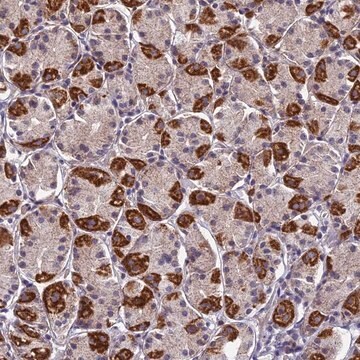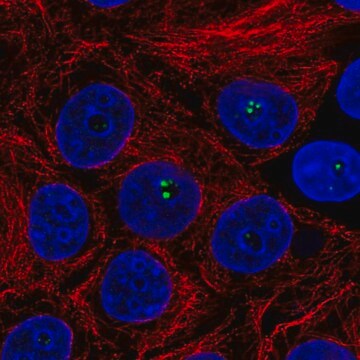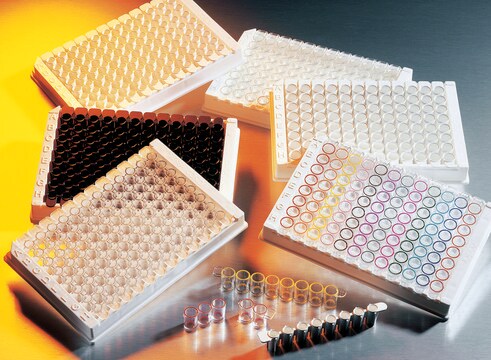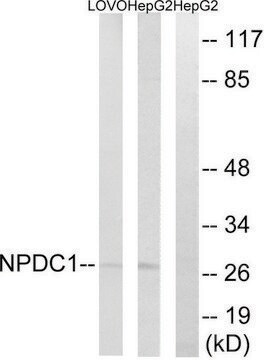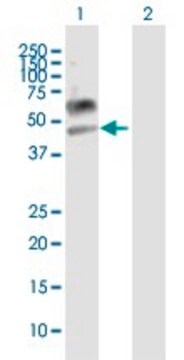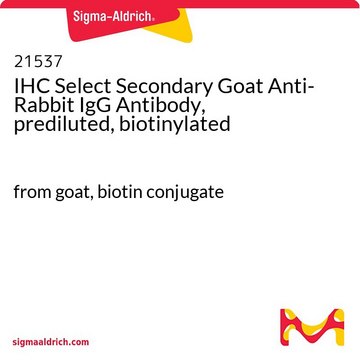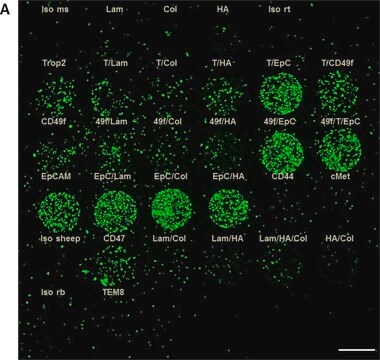HPA040465
Anti-PLAC8 antibody produced in rabbit
Prestige Antibodies® Powered by Atlas Antibodies, affinity isolated antibody, buffered aqueous glycerol solution
Synonim(y):
Anti-C15, Anti-Onzin, Anti-Placenta-specific 8
About This Item
Polecane produkty
pochodzenie biologiczne
rabbit
białko sprzężone
unconjugated
forma przeciwciała
affinity isolated antibody
rodzaj przeciwciała
primary antibodies
klon
polyclonal
linia produktu
Prestige Antibodies® Powered by Atlas Antibodies
Formularz
buffered aqueous glycerol solution
reaktywność gatunkowa
human
metody
immunoblotting: 0.04-0.4 μg/mL
immunohistochemistry: 1:1000-1:2500
sekwencja immunogenna
MQAQAPVVVVTQPGVGPGPAPQNSNWQTGMCDCFSDCGVCLCGTFCFPCLGCQVAADMNECCLCGTSVAMRTLYRTRYGIPGSICDDYMATLCCPHCTLCQIKRDINRRRAMRTF
numer dostępu UniProt
Warunki transportu
wet ice
temp. przechowywania
−20°C
docelowa modyfikacja potranslacyjna
unmodified
informacje o genach
human ... PLAC8(51316)
Opis ogólny
Immunogen
Zastosowanie
Western Blotting (1 artykuł) i jest również stosowane w barwieniu immunohistochemicznym.
Działania biochem./fizjol.
Cechy i korzyści
Każde przeciwciało Prestige jest testowane w następujący sposób:
- Macierz tkankowa IHC 44 normalnych tkanek ludzkich i 20 najczęściej występujących tkanek nowotworowych.
- Macierz białkowa 364 ludzkich rekombinowanych fragmentów białkowych.
Powiązanie
Postać fizyczna
Informacje prawne
Oświadczenie o zrzeczeniu się odpowiedzialności
Nie możesz znaleźć właściwego produktu?
Wypróbuj nasz Narzędzie selektora produktów.
Kod klasy składowania
10 - Combustible liquids
Klasa zagrożenia wodnego (WGK)
WGK 1
Temperatura zapłonu (°F)
Not applicable
Temperatura zapłonu (°C)
Not applicable
Wybierz jedną z najnowszych wersji:
Certyfikaty analizy (CoA)
Nie widzisz odpowiedniej wersji?
Jeśli potrzebujesz konkretnej wersji, możesz wyszukać konkretny certyfikat według numeru partii lub serii.
Masz już ten produkt?
Dokumenty związane z niedawno zakupionymi produktami zostały zamieszczone w Bibliotece dokumentów.
Nasz zespół naukowców ma doświadczenie we wszystkich obszarach badań, w tym w naukach przyrodniczych, materiałoznawstwie, syntezie chemicznej, chromatografii, analityce i wielu innych dziedzinach.
Skontaktuj się z zespołem ds. pomocy technicznej
